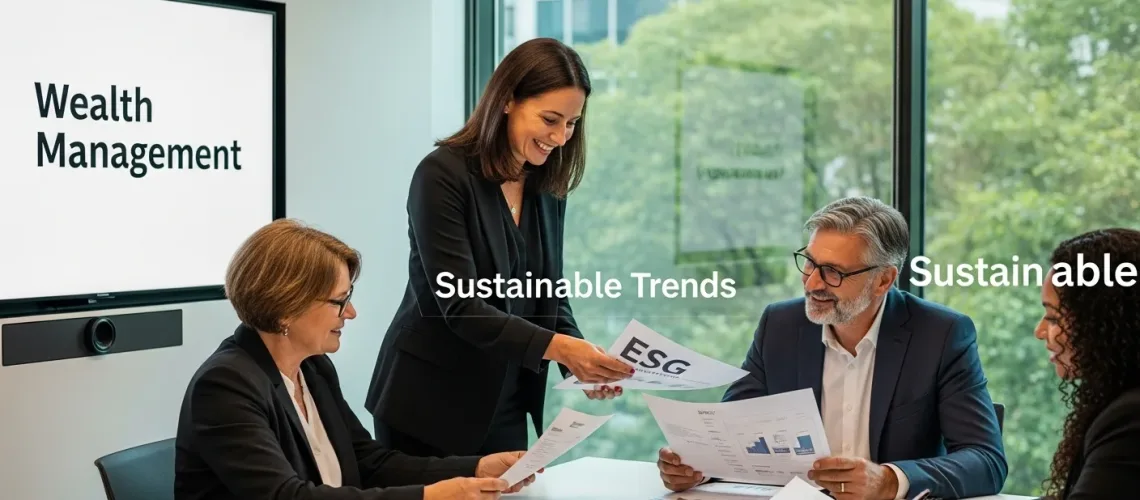Sustainable wealth management is changing the way people think about investing. More investors are making decisions that consider much more than just profits. In fact, ESG investments now account for over a third of all managed assets worldwide. This sounds impressive on its own. But sustainable investing is not just about keeping your conscience clear. It is actually reshaping what financial success looks like for the next generation.
Table of Contents
- What Are Sustainable Wealth Management Trends?
- Why Sustainable Wealth Management Is Important
- How Sustainable Wealth Management Works
- Key Concepts In Sustainable Wealth Management
Quick Summary
| Takeaway | Explanation |
|---|---|
| Sustainable investing integrates ESG factors. | This approach considers environmental, social, and governance elements alongside financial returns for comprehensive assessment. |
| Strategic engagement drives better corporate practices. | Wealth managers actively work with companies to enhance sustainability practices and accountability, promoting positive change. |
| Impact investing generates measurable societal benefits. | This specific strategy channels funds into projects that aim to produce both financial returns and positive social or environmental outcomes. |
| Dynamic portfolio management is essential. | Continuous monitoring and adjustment of investment strategies are necessary to respond to evolving global sustainability challenges effectively. |
| Risk assessment includes sustainability factors. | Comprehensive evaluation of environmental and social challenges allows for identifying potential investment risks and opportunities beyond traditional metrics. |
What are Sustainable Wealth Management Trends?
Sustainable wealth management represents a strategic approach to financial decision making that integrates environmental, social, and governance (ESG) considerations into investment processes. As global challenges like climate change and social inequality become more prominent, investors are increasingly seeking approaches that generate financial returns while creating positive societal impact.
The Core Philosophy of Sustainable Investing
Sustainable wealth management transcends traditional investment strategies by prioritizing long-term value creation through responsible investment practices. Unlike conventional approaches that solely focus on financial performance, this framework evaluates investments based on their potential economic returns and broader societal contributions.
Key characteristics of sustainable wealth management include:
- Comprehensive assessment of investment risks beyond financial metrics
- Active engagement with companies to promote sustainable practices
- Alignment of investment portfolios with global sustainability goals
- Integration of ESG criteria into investment decision making
Emerging Sustainable Investment Approaches
According to research from the OECD, sustainable wealth management is experiencing significant transformation. Ultra high net worth investors are increasingly adopting strategies that balance financial performance with positive environmental and social outcomes.
These approaches include impact investing, thematic sustainable investing, and ESG integration. Impact investing directly channels capital into projects or companies designed to generate measurable social and environmental benefits alongside financial returns. Thematic sustainable investing focuses on specific sustainability domains like renewable energy, clean technology, or social equity.
Wealth management professionals are developing sophisticated screening mechanisms to evaluate potential investments based on comprehensive sustainability criteria. This evolution represents a fundamental shift from viewing sustainability as a peripheral concern to recognizing it as a core component of strategic financial planning.
Why Sustainable Wealth Management is Important
Sustainable wealth management goes beyond traditional financial strategies by addressing critical global challenges and creating meaningful societal impact. As investors increasingly recognize that financial success cannot be separated from broader environmental and social considerations, this approach has become essential for responsible and forward thinking wealth preservation.
Addressing Global Challenges Through Strategic Investment
Investors play a pivotal role in driving systemic change by strategically allocating capital towards sustainable solutions. By directing financial resources into enterprises that prioritize environmental protection, social equity, and robust governance, wealth managers can catalyze meaningful transformations across industries.
Key motivations for sustainable wealth management include:
- Mitigating long term financial risks associated with environmental degradation
- Supporting innovative solutions to global challenges
- Creating positive social and environmental outcomes
- Aligning investment portfolios with personal values and ethical standards
Generating Comprehensive Value Beyond Financial Returns
According to research from the CFA Institute, sustainable wealth management represents a holistic approach to financial strategy. By integrating environmental, social, and governance considerations, investors can generate multifaceted value that extends far beyond traditional financial metrics.
This approach recognizes that economic prosperity is intrinsically linked with environmental sustainability and social progress. Sustainable wealth management allows investors to contribute to global sustainability goals while simultaneously protecting and growing their financial assets. The strategy encompasses a comprehensive evaluation of investment opportunities that considers not just potential financial returns, but also their broader impact on society and the planet.
Ultimately, sustainable wealth management empowers investors to become active participants in creating a more equitable and environmentally responsible global economic system.
How Sustainable Wealth Management Works
Sustainable wealth management operates through a comprehensive and dynamic approach that integrates financial performance with broader environmental, social, and governance (ESG) considerations. This sophisticated strategy transforms traditional investment methodologies by establishing a holistic framework for capital allocation and risk management.
Comprehensive Investment Screening and Analysis
The process begins with rigorous investment screening that goes beyond conventional financial metrics. Wealth managers employ advanced analytical tools to evaluate potential investments across multiple dimensions, ensuring that each investment meets stringent sustainability criteria.
Key components of the screening process include:
- Detailed ESG performance assessment
- Analysis of long term environmental and social impact
- Evaluation of corporate governance standards
- Assessment of potential sustainability risks and opportunities
Strategic Portfolio Construction and Monitoring
Once investments are identified, wealth managers construct portfolios that balance financial returns with sustainable impact. This involves creating diversified investment strategies that align with both financial objectives and broader societal goals.
According to research from the National Bureau of Economic Research, sustainable wealth management requires a dynamic approach that continuously monitors and adjusts investment strategies to reflect evolving global sustainability challenges.
Active Engagement and Continuous Improvement
Sustainable wealth management is not a static process but a continuous journey of engagement and refinement. Wealth managers actively collaborate with companies, encouraging them to improve their sustainability practices and transparency.
This approach involves:
- Regular dialogue with company leadership
- Voting on shareholder resolutions
- Pushing for increased sustainability reporting
- Supporting companies transitioning to more sustainable business models
By combining sophisticated financial analysis with a commitment to positive societal impact, sustainable wealth management represents a forward thinking approach to investment that recognizes the interconnected nature of financial success and global sustainability.

Key Concepts in Sustainable Wealth Management
Sustainable wealth management represents a sophisticated approach to financial strategy that integrates comprehensive environmental, social, and governance (ESG) considerations into investment decision making. This methodology transcends traditional financial frameworks by recognizing the intricate connections between economic performance and broader societal impact.
Environmental, Social, and Governance Framework
The ESG framework serves as the foundational architecture for sustainable wealth management. It provides a structured approach to evaluating investments based on their performance across three critical dimensions beyond purely financial metrics.
Key components of the ESG framework include:
The table below organizes key ESG (Environmental, Social, Governance) criteria used in sustainable wealth management, providing a quick overview of what each pillar represents.
| ESG Pillar | Description | Example Factors |
|---|---|---|
| Environmental | Evaluates company impact on nature and resources | Carbon emissions, resource usage |
| Social | Assesses company treatment of people & community | Labor practices, community programs |
| Governance | Examines company leadership and ethical practices | Board diversity, transparency |

- Environmental factors like carbon emissions and resource management
- Social considerations including labor practices and community engagement
- Governance standards addressing corporate ethics and leadership accountability
Sustainable Investment Strategies
Sustainable wealth management employs multiple sophisticated investment strategies designed to generate financial returns while creating positive societal impact. These approaches go beyond traditional screening methods to actively shape corporate behavior and drive meaningful change.
According to research exploring big data’s role in ESG investments, technological advancements are increasingly enabling more nuanced and data driven sustainable investment approaches. Wealth managers can now leverage sophisticated analytics to assess complex sustainability metrics with unprecedented precision.
Risk Assessment and Long Term Value Creation
A fundamental principle of sustainable wealth management is recognizing that financial risks are increasingly intertwined with environmental and social challenges. By integrating comprehensive risk assessment methodologies, wealth managers can identify potential vulnerabilities and opportunities that traditional financial analysis might overlook.
This approach involves:
- Comprehensive multi dimensional risk evaluation
- Proactive identification of emerging sustainability challenges
- Dynamic portfolio adjustment strategies
- Continuous monitoring of global sustainability trends
Ultimately, sustainable wealth management represents a transformative approach that reimagines investment as a holistic process of value creation encompassing financial returns, societal progress, and environmental stewardship.
Transform Your Sustainable Wealth Management Strategy With Future Family Office
As you explore the evolving landscape of sustainable wealth management, you may find yourself facing the challenge of staying ahead of ESG trends, identifying reliable strategies, and connecting with like-minded professionals. Many ultra-high-net-worth investors and family offices grapple with uncertainty around new sustainability frameworks and the need for transparency in the private wealth sector. The journey from understanding ESG principles to putting them into action demands both access to up-to-date knowledge and the right industry connections.
Future Family Office is designed to help you navigate these complexities. Leverage a powerful community hub where you can:
- Browse the latest news updates and thought leadership articles
- Connect with service providers specializing in ESG and sustainable investment
- Access exclusive reports and a comprehensive directory of global family offices

Ready to redefine your approach to sustainable investing? Join the Future Family Office platform today at https://futurefamilyoffice.net and instantly access tailored resources that empower your family office or investment strategy. Stay ahead of the trends, participate in a more transparent wealth management ecosystem, and drive meaningful impact with every investment decision.
Frequently Asked Questions
What is sustainable wealth management?
Sustainable wealth management is a financial strategy that integrates environmental, social, and governance (ESG) considerations into the investment process, aiming to generate financial returns while promoting positive societal impact.
How do investment strategies differ in sustainable wealth management compared to traditional wealth management?
Sustainable wealth management focuses on long-term value creation by assessing investments based on their potential economic returns and broader societal contributions, whereas traditional wealth management primarily emphasizes financial performance alone.
Below is a comparison of traditional and sustainable wealth management approaches to help clarify their core differences and benefits.
| Aspect | Traditional Wealth Management | Sustainable Wealth Management |
|---|---|---|
| Primary Focus | Financial returns | Financial returns plus ESG impact |
| Risk Assessment | Based on financial metrics | Includes environmental and social risks |
| Investment Screening | Conventional analysis | Comprehensive ESG screening |
| Engagement with Companies | Limited | Active engagement for sustainability |
| Portfolio Alignment | Financial goals | Financial and global sustainability goals |
| Long-Term Value Creation | Emphasized but limited to finance | Holistic, including societal and environmental |
| Portfolio Adjustment Frequency | Periodic, market-driven | Dynamic, responsive to sustainability trends |
What are some examples of sustainable investment approaches?
Examples include impact investing, which channels capital into projects with measurable social and environmental benefits, and thematic sustainable investing, which targets specific areas such as renewable energy or social equity.
Why is sustainable wealth management becoming increasingly important?
It is becoming important as investors recognize that financial success is linked to environmental and social considerations, and they seek to mitigate long-term financial risks and support innovative solutions to global challenges.




